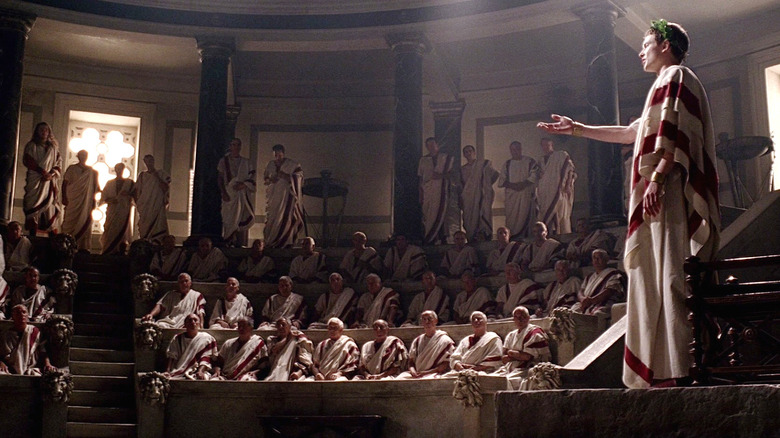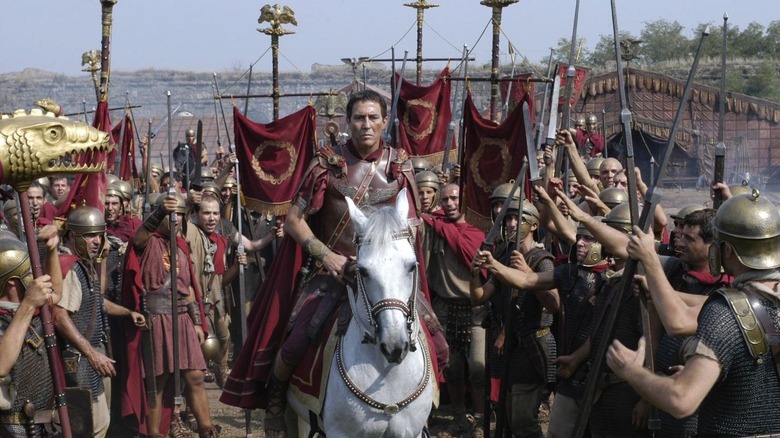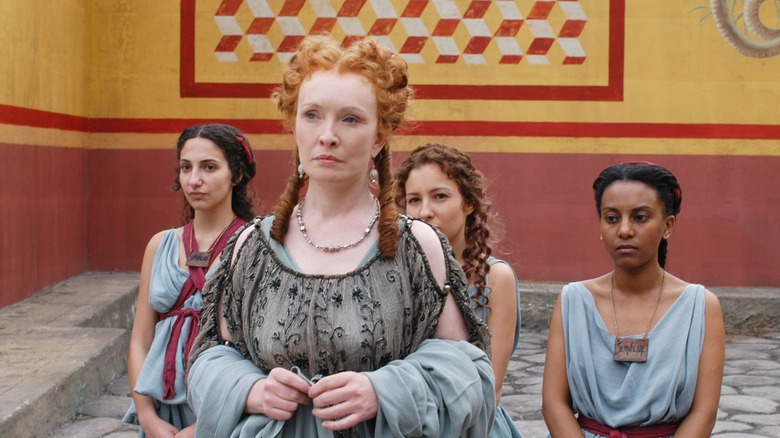Why HBO's Rome, One Of The Most Epic Shows Ever Made, Was Canceled
In the very early days of prestige television, a series appeared (some say it began the prestige era) that gave us a glimpse of what the future would hold. That series was "Rome," the story of the rise and fall of Julius Caesar (Ciarán Hinds) and the romance and death of Mark Antony (James Purefoy) and Cleopatra (Lyndsey Marshal). The series was gorgeous and full of rich historical detail, and the performances were spectacular.
The series, which ran from 2005-2007, came to us from John Milius (screenwriter for "Apocalypse Now," "Conan the Barbarian," and "Red Dawn"), William J. MacDonald ("Rough Riders," "Witchblade"), and Bruno Heller ("The Mentalist," "Gotham," and "Pennyworth"). It nabbed talented actors like Hinds, Purefoy, Marshal, Lindsay Duncan, Polly Walker, Tobias Menzies, Kevin McKidd, and the late Ray Stevenson. It won a Director's Guild award, seven Primetime Emmy Awards, and quite a number of others.
The sets were stunning and actually existed in the world, in the historic Cinecittà Studios, right in Rome, from the Forum to the slums to the villas of the rich and powerful. There are still scenes that give me chills (particularly the one where Duncan is covered in ashes, and if you've watched, you know which one I mean).
"Rome" was the most expensive series on television up to that point, with an estimated budget of $100 million for season 1, according to HBO Watch, making it the most expensive series of its time. The HBO/BBC production only lasted for two seasons, despite all of this. Let's take a look at why that is.
The high cost of the past
Heller told Den of Geek in a 2020 interview, "Most films, and even TV, is planning for battle. Planning for a big TV series like ['Rome'] is like planning for war, for a campaign. It's invading Russia." McKidd said of the budget in the same interview, "Ours, it was the first time anybody had tried this, so we just had to spend the money. And I think they figured out, it seems, ways to do it smarter or for less ... because our show came out of the gate just huge and bawdy and big, and unapologetic."
While the "Rome" first season budget is dwarfed by the $465 million for season 1 of "The Lord of the Rings: The Rings of Power," the latter aired almost two decades later. "Rome" just wasn't sustainable in its time. The set alone spanned five acres and six sound stages. They recreated the Forum, and it was shockingly close to the real thing. Every detail was heavily researched and poured over, from the fact that the statues were painted as they would have been at the time to the gritty Roman streets.
McKidd added that another issue was Italian production business practices, at least at the Cinecittà studio (which has served as the setting for films like "Roman Holiday" and "Gangs of New York"), which has been around since the time of Mussolini. He explained, "I heard enough to know [about] the scaffolding. I don't know how many tons of scaffolding was used to build that set, but I remember one of the earlier conversations was, 'We need to buy this much scaffolding.' And the people at Cinecittà were like, 'You can't buy that much scaffolding, but you can rent it from my brother.'"
Smashing several season's storylines together
Heller got the news about the cancellation deep into pre-production for season 2, leading him to restructure what was going to be a five-season story arc and pack it solid with the Antony and Cleopatra story. It did feel very overstuffed, though, I'll say that Marshal's brilliant and unusual casting as the Egyptian ruler made that fade into the background a bit.
The budget woes were understandable, despite how sad it made fans. A 2014 Entertainment Weekly article said that HBO executives privately expressed regret over the cancellation, and I do wonder if it would have happened in our current era of TV. However, "Rome" set the stage for future series like "Game of Thrones," "The Last of Us," and "Westworld." Heller said in the EW story that "Rome" was the first series shot out of the country that wasn't set in the present day. He added, "The mistakes we made are the mistakes 'Game of Thrones' learned from ... One of the challenges from HBO's point of view was 'Rome' had a large and ambitious structure, but we were making it up as we went along instead having those wonderful books."
There were rumors for years of a "Rome" movie, but nothing ever came of it. With the recent death of Ray Stevenson, it just wouldn't be the same anyway. While there may not be a future for "Rome," at least it's still currently streaming on Max.


